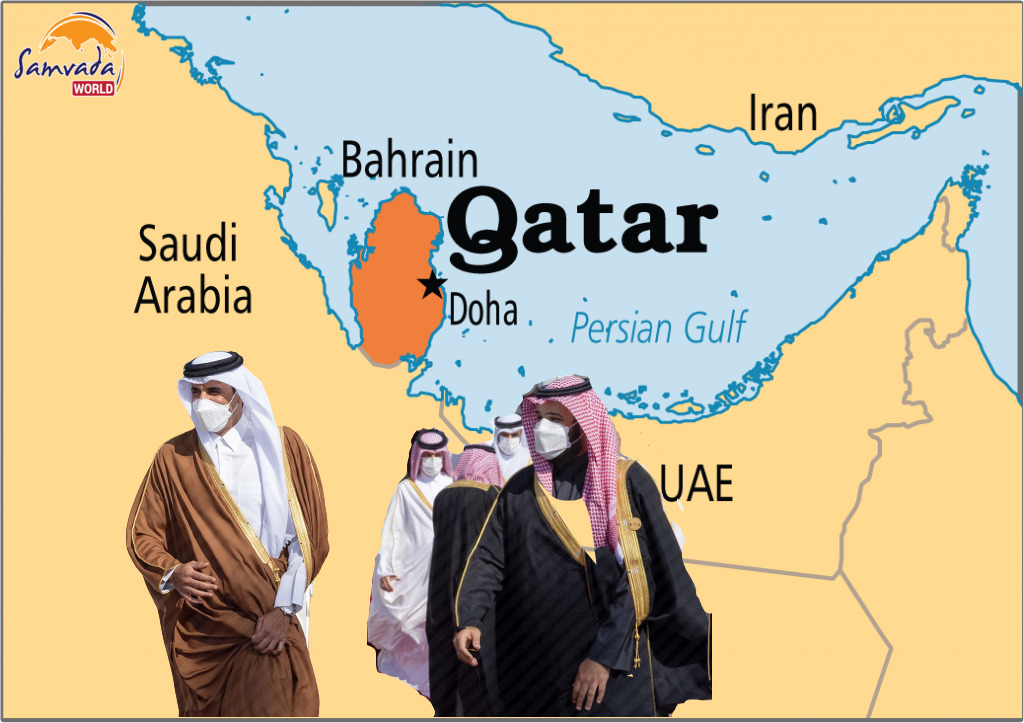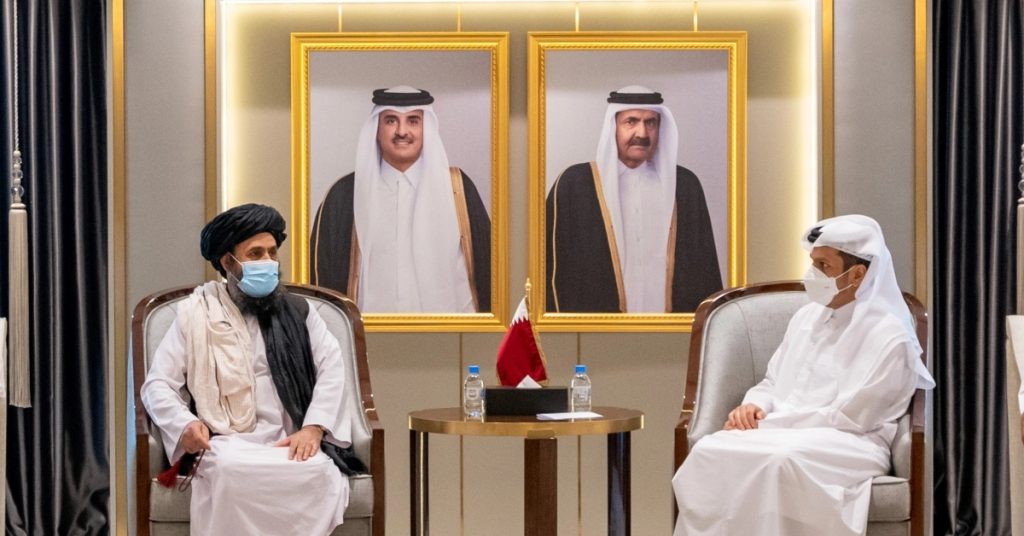
- Designation of Qatar as a major non-NATO ally by the United States has clearly paved the way for greater security co-operation and investments at a time when President Joe Biden is seeking help boosting the natural gas supplies in Europe.
- Qatar’s geostrategic location and its massive oil and natural gas reserves are the biggest strategic assets that have uplifted its global significance.
- Qatar’s investments have also been aimed at creating strategic alliances by gradually earning global friendships in the western, liberal, intellectual communities.
- It is quite recognizable that Qatar is resurgent through its foreign policy and has a sense of hyper geopolitical aspirations, but conveying any assumptions about its Islamist ideological commitments would have a devastating impact on it.
- It is also true that perception of the external world is learnt through vast experience in dealing with complex geopolitical issues which the Qataris clearly lack, and the reason being, language’s inability to transfer experience.
In the Middle East, Qatar has been acquiring a very significant role in the past few years, often for its geostrategic significance and sometimes infamously for its institutional terror linkages. A year ago the sanctions imposed by GCC (Gulf Cooperation Council) accusing Qatar of funding terror organizations and excessive media intervention, were lifted. Its role in Afghanistan was really a game changer. For more than a decade now, it has provided an international and diplomatic base to the Taliban, in its county. It has hosted and facilitated the US-Taliban peace deal, which led to the US withdrawal from Afghanistan. It is quite evident that Qatar has managed to emerge from its isolation and assert its place in not just the regional environment, but also in the global power dynamics.
Recently the United States has designated Qatar as a major non-NATO ally. This move clearly has paved the way for greater security co-operation and investments at a time when President Joe Biden is seeking help boosting the natural gas supplies in Europe. This status does not involve any defense obligations to Qatar and in practical terms it means that the US is not a guarantor for either tactical or strategic military interventions. But it facilitates closer military co-operation through access to US weapons, research, and technology which other US partners do not get access to. This also shows that the US is up for further entanglement with the Middle Eastern affairs at a time when the region is not quite serving the American interests.
It has been established that the leadership in Qatar has very close links with the Iranian establishment especially with their economic and commercial ties being at an all time high at this movement, and surprisingly this did not irk the US’s national security establishment. The main reason for this is the energy crisis in Europe. Countries like Germany which have a significant energy dependency with Russia are concerned about Russian expansionism in the European region. In fact this shows that Europeans are quite murky about their security alignments and partnerships. The USA by entering into this conundrum is steadily working to get Qatar to underwrite and substitute Europe’s energy needs.
It is well known to everyone as to how Qatar's Al-Jazeera media network, which is popularly known as the BBC of the Middle East, has been able to create an excellent perception management through their reportage in the Islamic world and also through their propaganda for the Qatari establishment.
Qatar’s geostrategic location and its massive oil and natural gas reserves are the biggest strategic assets that have uplifted its global significance. Its location in the Middle East in the Red Sea, surrounding very significant members in its vicinity provides it with both strategic and economic vantage points. It has one of the largest reserves of natural gas in the world. It is estimated that Qatar’s reserves alone can provide for the energy requirements of the Western Europe for the next twenty years. Qatar’s geo-positioning is so critical that the US central military command and its operational command have been located there. This is the primary military base through which the US is engaging in military confrontation and conflicts in the Middle East.
In fact, Qatar is one of the richest countries in the world with its per capita income of about $140,000 per annum, which is two times more than the USA’s per capita Income. This factor has been its main stimulant in creating massive investments across several domains. Its investments have also been aimed at creating strategic alliances by gradually earning global friendships in the western, liberal, intellectual communities. It’s well known to everyone as to how their Al-Jazeera media network, which is popularly known as the BBC of the Middle East, has been able to create an excellent perception management through their reportage in the Islamic world and also through their propaganda for the Qatari establishment.
The diplomatic dynamism and open mindedness to host diverse gatherings involving international communities and transnational organizations demonstrates the fact that Qatar is excellent at the diplomatic craft, and in promoting the culture of purpose and self interest driven multilateralism, which obliterates the boundaries of ideological and philosophical groundings to create a geo-economic sphere driven by countries commercial self interests. It believes that by creating a framework such as this its international prestige would increase several manifolds.

Their strategic communication skills are quite exemplary as they employ the cultural, ethnic, religious, and behavioral patterns to determine the perceptions towards the external world. But all of this comes with pertinent dangers of selective awareness and selective exposure that can become a threat to their own national interests. It is also true that perception of the external world is learnt through vast experience in dealing with complex geopolitical issues which the Qataris clearly lack, and the reason being, language’s inability to transfer experience. For example, to learn the English language is one thing, but having an intrinsic awareness about England’s cultural, religious and ethnic ethos is entirely different.
It is quite clear that Qatar does not promote liberalism, and neither does it advocate another Arab Spring. But furthering its engagement in the revolutionary Islamic revivalism through its tacit support to terrorism can hamper its relations even with the USA.
The reason why I make this point is, though Qatar’s role in the maneuvering of geopolitics is relatively new. The Saudis and the Emiratis (UAE) had already mastered what Qataris are now doing, way back in the mid 1990’s. Saudi Arabia had previously enjoyed the same status that Qatar is now enjoying with Afghanistan through its political and diplomatic backing. When the Taliban ruled in the late 1990’s the Saudis and Emiratis were the only Arab Nations that recognized them as a political entity. They consistently developed several channels of communications and networks that penetrated the county quite deeply. Yet these channels of influence and political access withered under the counter-revolutionary after the Arab Spring as well as through the reification of very rigid, hierarchical orders within their own nations.
It is quite recognizable that Qatar is resurgent through its foreign policy and has a sense of hyper geopolitical aspirations, but conveying any assumptions about its Islamist ideological commitments would have a devastating impact on it. It is quite clear that Qatar does not promote liberalism, and neither does it advocate another Arab Spring. But furthering its engagement in the revolutionary Islamic revivalism through its tacit support to terrorism can hamper its relations even with the USA, as it would easily find alternatives for the fuel arrangement in the region, leading to isolationism and the return of even harsher sanctions upon Qatar. It’s in Qatar’s interest to become a pragmatic actor by understanding the complexities and nuances in geopolitics. Given its growing prominence in the world, Qatar is likely to play a pragmatic, realist and even an obsequious role in order to meet its own national self interest in the region as well as in world politics.
(The author has a MA in political science and international relations. Views expressed are authors own)
Viswapramod is a PhD Scholar at the Department of International Studies and Political Science, Christ University, Bangalore. He has an MA in International Relations. Views expressed are the author’s own.
